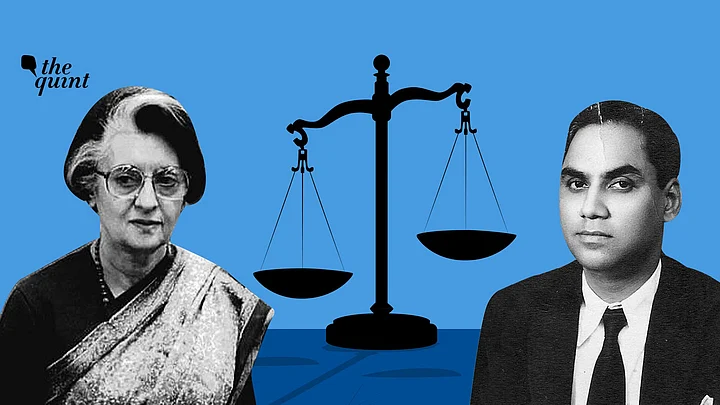(This article was first published on 12 June 2020. It has been reposted from The Quint’s archives to mark the anniversary of the imposition of Emergency in 1975.)
On 12 June 1975 – forty-five years to the day – Justice Jagmohanlal Sinha of the Allahabad High Court gave a judgment that set in motion a train of events that changed the course of India’s history.
Sinha allowed Raj Narain’s petition accusing Prime Minister Indira Gandhi of corrupt practices in the 1971 Lok Sabha election contest from the Rae Bareli parliamentary constituency. Raj Narain, a leader of the Socialist Party, was Mrs Gandhi’s main rival.
I was present in court as Sinha delivered his judgment for which the whole nation waited with the greatest anticipation. This is a brief personal memoir of that day.
When Justice Sinha Began Hearing the Raj Narain Case, No One Could Have Predicted the Verdict
My family was part of the legal fraternity of the Allahabad High Court. My father was a judge of the court and Sinha’s colleague; in fact, they had sat on the same bench for many months.
Not surprisingly, families associated with the legal profession knew each other well but followed a time-honoured norm of never discussing ongoing cases.
So, when Sinha began hearing the Raj Narain case, no one asked him anything about it at social gatherings. But everyone kept abreast of it as its proceedings were widely reported in the press.
Based on these reports, people speculated about the case and the view Sinha would take – but no one knew what it would be.
One day, eight or nine months before the decision, Justice Sinha was at a social gathering where I was also present. I could not resist, and quipped: “Uncle, the first two letters in your and Judge Sirica’s surnames are the same”. Judge Sirica was then internationally known for his decisions in the Watergate trial which precipitated events leading to President Richard Nixon’s resignation.
Sinha smiled and remarked: “Badmash ho”. Everyone present laughed.
How My Father ‘Read’ Justice Sinha’s Mind
The courtroom was full. The atmosphere charged. A hush descended as Sinha entered and took his seat. The judgment was placed before him. The court master asked everyone to maintain decorum and hear the judgment in silence.
Sinha began reading its concluding and operative paragraphs. The courtroom was deadly quiet as he read on. As it became clear which way his decision was going, a murmur began. It grew louder as he reached the final paragraph holding Indira Gandhi guilty of corrupt practices and set aside her election. This effectively meant that she could not hold electoral office for six years. Then the courtroom erupted.
I left and reached home in a few minutes and went to Father. He looked up and I merely said “Gayi”. He smiled. But that smile had special meaning for me.
As he read the newspapers’ accounts of what was transpiring in the case and the evidence that was being recorded, I kept asking him what would Sinha do. He did not respond till the hearings concluded and judgment was reserved. He then told me, “He will decide against her.” “How do you know,” I had asked. He had responded: “I know how his mind works”. That became our secret.
When Indira Gandhi’s Lawyers Requested for the Judgment to be Stayed
Soon, some of Father’s friends came to our home. Naturally, the discussion centred around Indira Gandhi’s options. While Father kept his own counsel, everyone else felt she would have to resign.
An hour or so later, a close friend of Father’s arrived with the news that Sinha had stayed his judgment. This came as a surprise.
Father’s friend said that Indira Gandhi’s lawyers went to Sinha’s chamber and said that they would appeal to the Supreme Court and requested a stay of the judgment. Sinha asked that he would like to hear Raj Narain’s lawyers too, and Indira Gandhi’s lawyers went out to look for them.
Except, Father’s friend said, they did not ostensibly find them, though Raj Narain’s lawyers were present in the High Court premises surrounded by their admirers. Indira Gandhi’s lawyers returned to Sinha’s chamber and said that the opposing counsel had left, and as the matter had the highest political implications he should give a stay straight away. He did so.
How Indira Gandhi Stayed On As PM & Went On to Declare Emergency
The news that Sinha had stayed the judgment reached Raj Narain’s counsel. They rushed to Sinha and told him that as he was only listed to deliver the judgment, he had no competence to pass any other order including staying his own judgment; that could only be done by the vacation judge – the court was on summer vacation.
Sinha agreed and said that he could not compound his mistake by hearing the matter anymore and that it should be placed before the vacation judge.
It was but he did not interfere, and the stay continued, and so did Indira Gandhi as prime minister.
Two weeks later – on 26 June – Father’s close friend called early in the morning. He said that Indira Gandhi had declared an internal emergency, political leaders had been arrested, and power supply to newspapers in Delhi had been cut off during the night. We switched on the radio. The grim news was confirmed by Akashvani bulletins.
A long period of darkness ensued. India was never the same again.
(The writer is a former Secretary [West], Ministry of External Affairs. He can be reached @VivekKatju. This is a personal blog, and the views expressed above are the author’s own.The Quint neither endorses nor is responsible for them.)
(At The Quint, we question everything. Play an active role in shaping our journalism by becoming a member today.)
